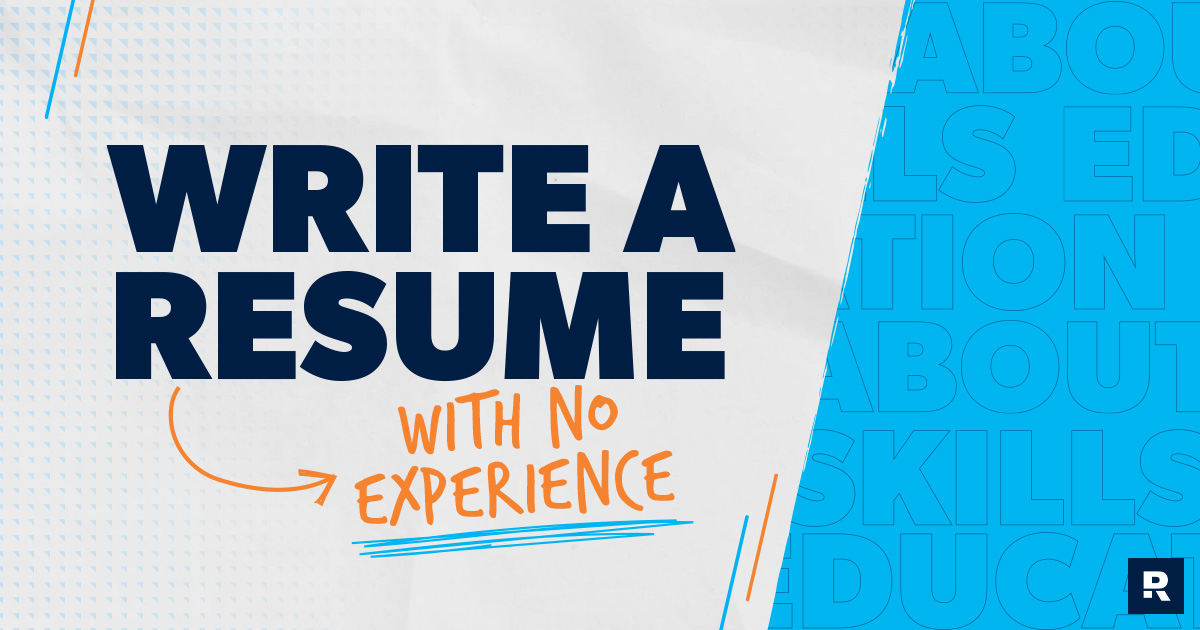
Maybe you’ve recently graduated high school or college, or maybe you’re a stay-at-home parent who’s ready to get back in the workforce. No matter what your work experience has or hasn’t been up until today, I can guarantee you’ve got plenty of qualifications to share with hiring managers and job recruiters if you’re making a new resumé without much work history. If you’re ready to get out there and take the work world by storm, here are five ways to make a resumé when you’re starting from scratch.
How to Write a Resumé With No Experience
If you’re worrying about how to write a resumé with no experience, I’m here to reassure you—you’ve already got plenty of skills and experience under your belt. It’s just a matter of brainstorming all your experiences and getting that information into the right resumé format.
When I wanted to change my career path years ago, I didn’t have much—if any—experience in broadcast (I had a background in politics), but I knew I had plenty of people skills and communication talent I could put on my resumé. So that’s what I did! Over time, it worked, and I got more and more opportunities.
Before we get started, I want you to think about why you’re job hunting and what type of work you’re looking for. Once you know those answers, it’s time start writing up your resumé. Are you ready? Let’s start at the beginning.
1. Choose a format for your resumé.
Every resumé should include a section about your career objective, education, skills and other relevant experience. Don’t worry right now about what to write if you don’t have job experience—you simply need to select a resumé template to get started. (I have several templates you can choose from to build your first resumé.) Make sure you use a template that has sections for your education, skills and who you know. When it comes to choosing a template, keep the font clean and simple and don’t go crazy with any clip art or busy designs. You want your skills to stand out, not the design.
2. Add your contact information and a career objective first thing.
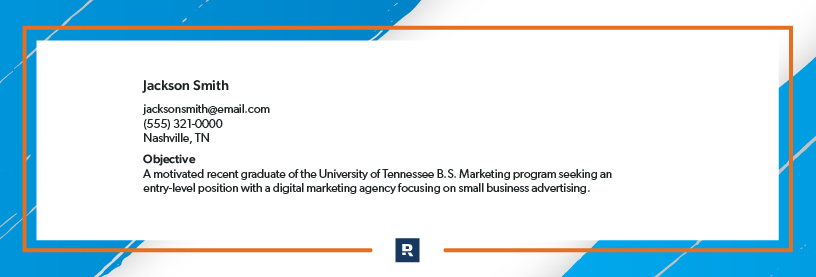 First things first—hiring managers need to know who you are and what you’re all about. In the header section of your resumé, add your full name, phone number, email address and the city and state where you live.
First things first—hiring managers need to know who you are and what you’re all about. In the header section of your resumé, add your full name, phone number, email address and the city and state where you live.
Next, once you have a good idea of why you’re looking for a new opportunity, I want you to write that thought down in one or two sentences below your contact information. This will be your career objective. Describe the type of job or professional experience you’re looking for, along with a professional goal. For example, you could write: “Seeking an entry-level digital marketing opportunity to help business owners expand their online presence.” Keep it short and sweet.
3. Describe your education.
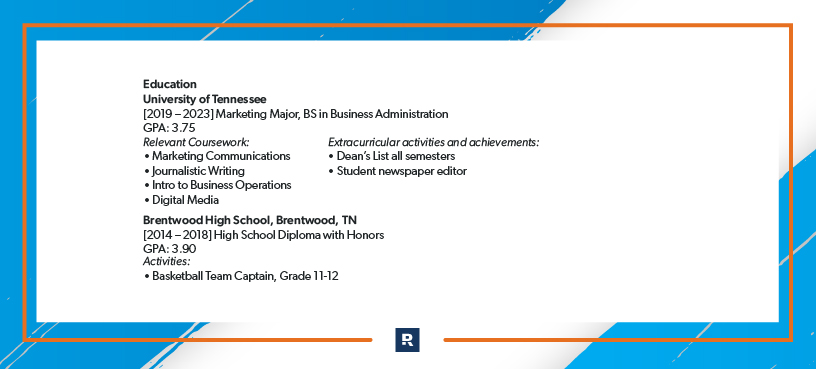
If you haven’t been employed before, or you just don’t have much professional experience, you’ll rely on your education to bulk up your resumé. You can talk about what you learned, the skills you developed by working on projects with your classmates, and how any extracurricular activities helped you grow and stretch. Here are a few ways you can emphasize your experience from school:
-
Start with the basics about your school.
What was the name of your school? Where was your school? What years did you attend? Keep it simple when you answer these questions.
-
Describe your degree or the focus of your coursework.
Add any degree you completed or the area of focus for your classes. And even if you didn’t go to college, you can include any special areas of focus from high school or your GED program.
-
Include any honors or awards you received.
Did you graduate at the top of your class or get performance awards for your program? Note any special recognition you got for a job well done.
-
Describe important projects you worked on.
Maybe you helped photograph the basketball team as a side project for your photojournalism class, and those pictures became the posters hanging in the school hallways. Or maybe you took initiative to organize spirit week during homecoming season. Make a note of anything you accomplished that had an impact outside of your normal classes.
-
Add any student leadership positions you held.
Were you captain of the lacrosse club or student council secretary? Note the role you held and a brief description of your responsibilities. This will demonstrate your people skills (also known as soft skills).
-
Note any certifications or online classes you took.
When you write about your education, you should include what you learned outside of school too. If you’ve ever taken a continuing education course or certification for fun or learned skills through online programs (like Masterclass or LinkedIn Learning), you can include those in this section.
4. Brainstorm and share examples of your community involvement.
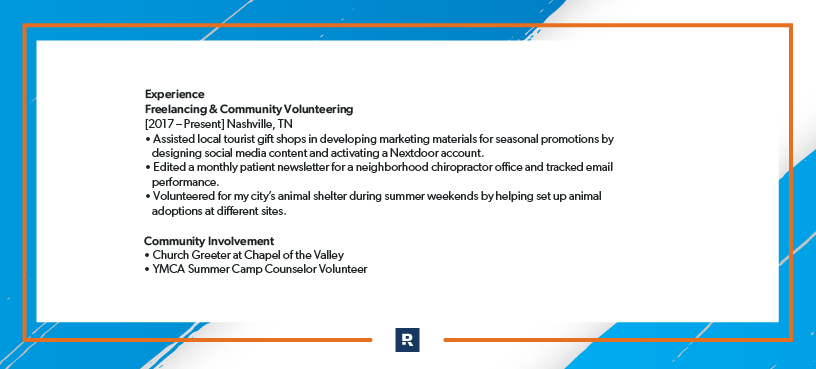 It’s okay if you don’t have job experience to list on a resumé—your life experience and community involvement has given you other valuable skills. Here are some ideas of community involvement you can think about sharing on your resumé:
It’s okay if you don’t have job experience to list on a resumé—your life experience and community involvement has given you other valuable skills. Here are some ideas of community involvement you can think about sharing on your resumé:
-
Tutoring Others
If you helped your siblings or other students with coursework or studying, list that experience on your resumé. This is a perfect example of a time when you developed people skills and expertise in a certain subject.
-
Leading Social Groups
Guys, you don’t have to have manager experience to be a leader. If you’ve ever volunteered as a camp counselor or been a member of Boy Scouts of America or other social groups where you led your peers or projects, be sure to include that information on your resumé.
-
Fundraising for Special Causes
Recruiters love to see numbers, so even without official work experience, you can still demonstrate your success in raising money or helping a cause that matters to you. Think of any fundraisers you’ve been a part of, like running races to benefit medical research or supporting a local animal shelter by selling T-shirts or snacks. How much money did you raise? How many animals did you help? Numbers are helpful here.
-
Helping With Events
Did you help set up the annual fall festival in your neighborhood or volunteer to collect canned goods or books for volunteer drives? Make sure you list those examples.
-
Volunteering at Church
Were you a greeter at church? What about a small group coordinator? These probably weren’t paid jobs, but they count as experience. Think back to any way you were involved in helping with people or projects at church and add that in your community section.
5. List your skills.
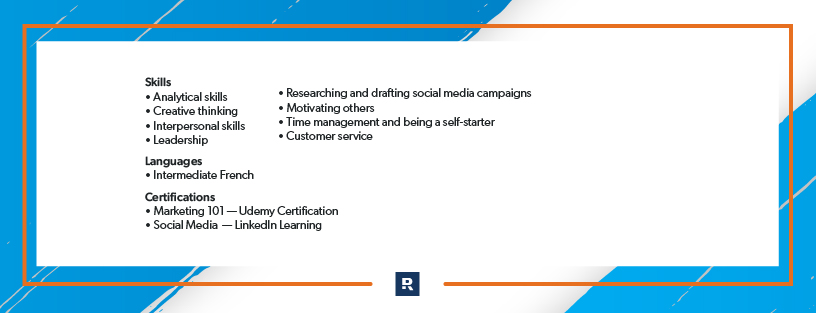 I can guarantee that with all your experience from school, community and general life, you’ve got a solid list of skills just waiting to be shared on your resumé. When I found myself writing a resumé with no experience that matched the jobs I wanted, I focused on skills that were transferrable, which means they’re useful and needed no matter what job you’re doing. Everyone will have a different combination of transferable skills because that’s the nature of being a unique human with a unique purpose. (Here's a list of the best resumé skills you can add to your resumé if you need some ideas.)
I can guarantee that with all your experience from school, community and general life, you’ve got a solid list of skills just waiting to be shared on your resumé. When I found myself writing a resumé with no experience that matched the jobs I wanted, I focused on skills that were transferrable, which means they’re useful and needed no matter what job you’re doing. Everyone will have a different combination of transferable skills because that’s the nature of being a unique human with a unique purpose. (Here's a list of the best resumé skills you can add to your resumé if you need some ideas.)
Get Everything You Need to Land the Job You Love!
And because I want your resumé to stand out to hiring managers, don’t use generic terms like these listed here when you describe your skills and other experiences:
- Leadership
- Collaborate
- Responsible for
- Communication
- Achieved
- Worked on
- Improved
- Researched
- Created
- Managed
Instead, look through this list of 200 resumé words that stand out.
Resumé Example for a First Job
If you’re looking for a resumé example for a first job, this is a good place to start. You’ll want to match your resumé as closely as you can to the job description for the role you’re applying for. That will give you a better shot at landing an interview.
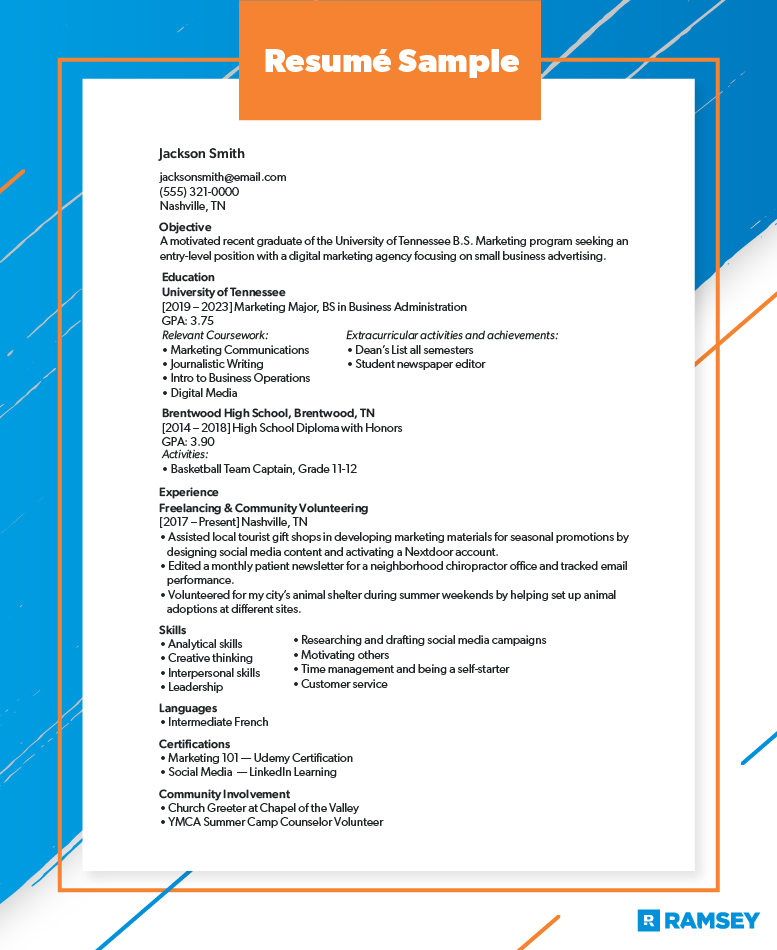 Get Started on Your New Career Path
Get Started on Your New Career Path
I’m excited for you to take your first steps into the work world. If you want to get a really clear idea of what your best skills and passions are before you write your resumé, check out my Get Clear Career Assessment for Students. You’ll learn what your unique skills are that’ll look great on a resumé and grab a hiring manager’s attention. Using this guide is a great way for you take the next step on your path to doing work that matters. Try it out today!

